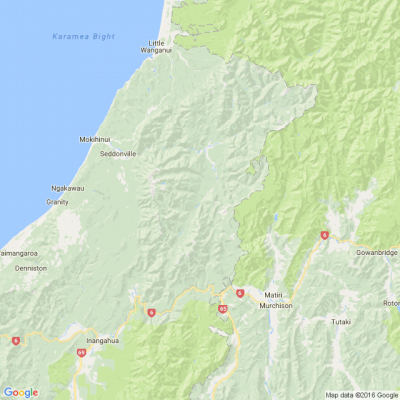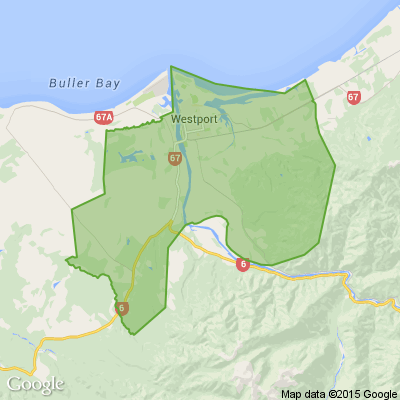Road authority has ‘little appetite’ to argue with West Coast communities
From local democracy reporter Brendon McMahon:
Waka Kotahi NZ Transport Agency (NZTA) has "little appetite to buy arguments" with local communities over speed limits, the West Coast Regional Transport Committee has heard.
Several West Coast speed hot spots on the books for some time are still to be lowered, the committee heard this week.
These include the current 70kph zone outside Karoro School in Greymouth and the 70kph through Blacks Point near Reefton.
Karoro School has been calling for a review for several years, including lengthening the current 50kph speed zone which ends north of the school, near the Australasian Hotel, to replace the 70kph zone outside the school.
At Blacks Point, residents have been calling for a lower speed limit for decades including a recent plea to lower it to 30kph due to the blind spots, and people not slowing down on the winding section through the village.
Now the West Coast Regional Transport Committee, via the regional council, is required to co-ordinate input from road controlling agencies, including NZTA and district councils, for a regional speed management plan.
A report to the committee said the first full planning period for the new regional plan was likely to be the three years from July 2027.
It was not recommended the group prepare an interim regional speed management plan.
West Coast Regional Council strategy and communications manager Nichola Costley, said the first regional plan was not expected to be more than "a compilation process".
However, NZTA regional relationships director James Caygill said the agency would be consulting on an interim plan for the region before the 2024-27 period.
This could be as early as the end of this year or in early 2023.
It was expected to include all state highway 40kpm school speed zones on the West Coast.
"I would expect some school work and some minor tidy-ups," he said.
This included finishing off a review of the Blacks Point 70kph zone where residents had been "loud and clear".
Otherwise, no big surprises were expected in the interim plan, Caygill said.
Committee chairman Allan Birchfield said he thought the committee had already agreed to reduce the speed on State Highway 7 at Blacks Point, with a commitment to review the 100kph open road limit on the entire 59km of that road, from Reefton to Springs Junction.
Caygill said the agency had consulted and it was "interested in advancing speed reductions where they are acceptable for communities".
However, committee member Peter Haddock said the committee had made it clear in the past it did not want "widespread" speed reductions on long stretches of open road.
He gave the example of State Highway 73 and West Coasters apparently not wanting to be unnecessarily delayed on the road to go about their business in Canterbury, including urgent medical appointments.
Haddock understood from the agency that "people don't want to be chopping and changing all the time".
"But it's unacceptable on State Highway 73 where people have got certain times they have to get to Christchurch," he said.
"There is no doubt there are certain areas that need speed reductions to avoid crashes... but what we don't want to see is it going for 50 miles or 100km or something."
* Public interest journalism funded through NZ On Air
Poll: Should the government levy industries that contribute to financial hardship?
As reported in the Post, there’s a $30 million funding gap in financial mentoring. This has led to services closing and mentors stepping in unpaid just to keep helping people in need 🪙💰🪙
One proposed solution? Small levies on industries that profit from financial hardship — like banks, casinos, and similar companies.
So we want to hear what you think:
Should the government ask these industries to contribute?

-
59.3% Yes, supporting people is important!
-
26.2% No, individuals should take responsibility
-
14.5% ... It is complicated
Have you got New Zealand's best shed? Show us and win!
Once again, Resene and NZ Gardener are on the hunt for New Zealand’s best shed! Send in the photos and the stories behind your man caves, she sheds, clever upcycled spaces, potty potting sheds and colourful chicken coops. The Resene Shed of the Year 2026 winner receives $1000 Resene ColorShop voucher, a $908 large Vegepod Starter Pack and a one-year subscription to NZ Gardener. To enter, tell us in writing (no more than 500 words) why your garden shed is New Zealand’s best, and send up to five high-quality photos by email to mailbox@nzgardener.co.nz. Entries close February 23, 2026.

Poll: As a customer, what do you think about automation?
The Press investigates the growing reliance on your unpaid labour.
Automation (or the “unpaid shift”) is often described as efficient ... but it tends to benefit employers more than consumers.
We want to know: What do you think about automation?
Are you for, or against?

-
9.7% For. Self-service is less frustrating and convenient.
-
43.1% I want to be able to choose.
-
47.2% Against. I want to deal with people.






 Loading…
Loading…





